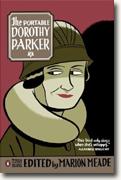The Portable Dorothy Parker
Marion Meade, ed.
book reviews:
· general fiction
· chick lit/romance
· sci-fi/fantasy
· graphic novels
· nonfiction
· audio books
· author interviews
· children's books @
curledupkids.com
· DVD reviews @
curledupdvd.com
newsletter
win books
buy online
links
home
for authors
& publishers
for reviewers

 |
The Portable Dorothy Parker Marion Meade, ed. Penguin Paperback 640 pages March 2006 |
|
In the annals of 20th-century American literati, a sturdy legend is that of a group of writers who met in the 1920s at New York's Algonquin Hotel to, it almost seems, provide items, pithy quotes, and witticisms for what then was the city's many newspapers with copy-hungry columnists. Among the most quoted of those who had earned a place at the hotel's round wooden table (which itself became legend) was Dorothy Parker (1893-1967) who lived to express regret at her early reputation for lightning-quick wit. In a 1956 Paris Review interview, she said, ”Why, it got so bad that they began to laugh before I opened my mouth.”
Though the Parker wit is represented in this compilation, it becomes the co-equal of probably lesser-known material. Much of it reflects aspects of the society and culture of her times - the 1920s, which segued with terrifying speed from giddy to grave; the 1930s, when the nation experienced grindingly hard times; the war-time 1940s; then beyond, right up to the mid-1960s. Male-female relationships are the subject of many of her included poems. I prefer the ones ruefully wise or mocking in tone, as in “Unfortunate Coincidence”: By the time you swear you're his,Shivering and sighing, And he vows his passion is Infinite, undying ---- Lady, make a note of this: One of you is lying. Various short fiction pieces also are he-she centered, touching on drastic mis-matches, husband-wife power inequities, and the pitfalls of dependency for women of Parker's era. The title character of “Big Blonde” -- which won the 1929 O. Henry Prize for best short fiction - is described by Marion Meade, a Parker biographer who wrote the anthology's introduction. It centers, she says, on “Hazel Morse, former model, former wife, now a swinging party girl who is forced to rely on a string of sugar daddies for her rent.” Parker's opening sentence seems pitch-perfect and painfully specific in establishing the context within which her character was placed: “Hazel Morse was a large, fair woman of the type that incites some men when they use the word 'blonde' to click their tongues and wag their heads roguishly.” As a critic, Parker's pen could be poisonous or honeyed but, from the pieces included here, never banal. Examples:
Yet at times opportunity led Parker to breach her own lofty standard. One occasion was a period when, along with writers such as F. Scott Fitzgerald, she toiled in Hollywood for handsome remuneration. Collaborating with her then husband, she crafted some two dozen screenplays, including the 1937 Oscar-nominated A Star Is Born. Yet like others of her New York literary set, including Fitzgerald, she chafed at the Hollywood experience. In a 1962 letter, she expressed her feelings bluntly: “We were pretty much sickened by what the studio (20th Century Fucks) did to the darling, bawdy farce we wrote for Marilyn Monroe.” Darling? Bawdy? Those two adjectives might have served to describe Dorothy Parker herself! Originally published on Curled Up With A Good Book at www.curledup.com. © Norma J. Shattuck, 2006 |
|
|
|
 Click here to learn more about this month's sponsor! |
|
| fiction · sf/f · comic books · nonfiction · audio newsletter · free book contest · buy books online review index · links · · authors & publishers reviewers |
|
| site by ELBO Computing Resources, Inc. | |
 By 1956, of course, she had become a writer not only prolific but protean who had published short stories, play and movie scripts, poems, profiles, book, drama, and film reviews. That this compilation is door-stop size is not surprising considering Parker's broad-gauge skills and long career, forged despite the daunting realities of being a talented woman scrambling to support herself in competition with other writers, mostly male, in the fast-track New York literary world of the first half of the 20th century.
By 1956, of course, she had become a writer not only prolific but protean who had published short stories, play and movie scripts, poems, profiles, book, drama, and film reviews. That this compilation is door-stop size is not surprising considering Parker's broad-gauge skills and long career, forged despite the daunting realities of being a talented woman scrambling to support herself in competition with other writers, mostly male, in the fast-track New York literary world of the first half of the 20th century.